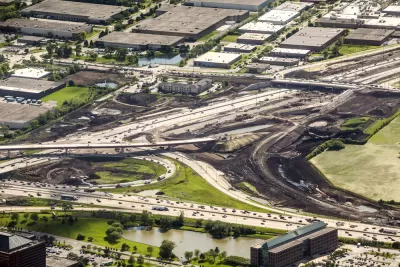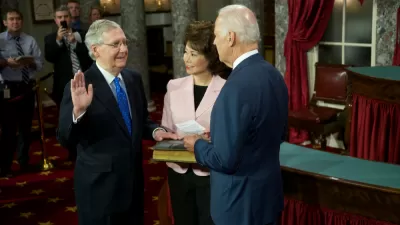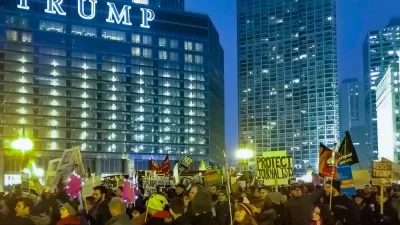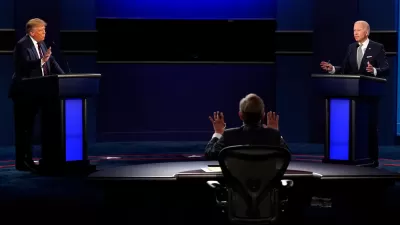President Donald Trump teased the release of his promised $1 trillion infrastructure earlier this month. Here's how a collection of experts reacted to that prospect.

An article for Grist by Nathanael Johnson and Matt Graft surveys a collection of experts on how they would spend the $1 trillion promised by President Trump to fix the nation's infrastructure. According to Johnson and Graft, "just about all" of the surveyed experts "panned Trump's ideas," so the article expresses an awareness that Trump might be over promising on this issue.
The collection of experts includes Lynn Richards, president and CEO of the Congress for New Urbanism; Aaron Renn, senior fellow at the Manhattan Institute; and Charles Marohn, founder and president of Strong Towns, among others.
In a separate article for CityLab, Anthony Flint provides a dispatch from the APA's National Conference in New York City, where Trump's expected infrastructure plans were "high on the agenda." Here, Flint also expresses reservations about the prospects for Trump's infrastructure plan by calling for a "stop-and-think moment." Flint's main concern: that rushing to build "shovel ready" projects will not allow for quality analysis of how projects will perform once they are built. Instead of "shovel ready", Flint suggests the following criteria:
A more cold-eyed approach fully considers the cost of funding, the length of the investment, and the duration of the benefits generated. Planners need to maximize benefits over the full lifecycle of any project, and be mindful of maintenance costs. Additionally, careful consideration should be given to what economists call non-pecuniary benefits and costs—those hard-to-measure ramifications.
Flint suggests more criteria, including resilience and sustainability, and points out some examples from the region and city surrounding the location of the APA's National Conference of how infrastructure projects can go wrong.
FULL STORY: How Trump could spend $1 trillion to fix America if he knew what he was doing

Alabama: Trump Terminates Settlements for Black Communities Harmed By Raw Sewage
Trump deemed the landmark civil rights agreement “illegal DEI and environmental justice policy.”

Study: Maui’s Plan to Convert Vacation Rentals to Long-Term Housing Could Cause Nearly $1 Billion Economic Loss
The plan would reduce visitor accommodation by 25% resulting in 1,900 jobs lost.

Why Should We Subsidize Public Transportation?
Many public transit agencies face financial stress due to rising costs, declining fare revenue, and declining subsidies. Transit advocates must provide a strong business case for increasing public transit funding.

Wind Energy on the Rise Despite Federal Policy Reversal
The Trump administration is revoking federal support for renewable energy, but demand for new projects continues unabated.

Passengers Flock to Caltrain After Electrification
The new electric trains are running faster and more reliably, leading to strong ridership growth on the Bay Area rail system.

Texas Churches Rally Behind ‘Yes in God’s Back Yard’ Legislation
Religious leaders want the state to reduce zoning regulations to streamline leasing church-owned land to housing developers.
Urban Design for Planners 1: Software Tools
This six-course series explores essential urban design concepts using open source software and equips planners with the tools they need to participate fully in the urban design process.
Planning for Universal Design
Learn the tools for implementing Universal Design in planning regulations.
Caltrans
Smith Gee Studio
Institute for Housing and Urban Development Studies (IHS)
City of Grandview
Harvard GSD Executive Education
Toledo-Lucas County Plan Commissions
Salt Lake City
NYU Wagner Graduate School of Public Service





























